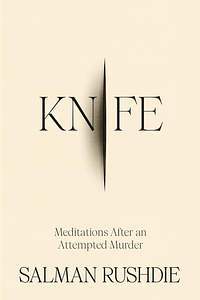Take a photo of a barcode or cover
dark
hopeful
reflective
sad
slow-paced
inspiring
reflective
fast-paced
hopeful
inspiring
reflective
medium-paced
dark
inspiring
reflective
slow-paced
emotional
inspiring
reflective
medium-paced
dark
emotional
hopeful
reflective
sad
medium-paced
reflective
challenging
dark
emotional
hopeful
inspiring
reflective
sad
tense
medium-paced
dark
emotional
hopeful
informative
inspiring
reflective
sad
tense
slow-paced
As a long time fan of Salman Rushdie, reading “Knife” was a different, but transformative experience. Part reflective, part experimental, and part sentimental the prose is wholly what one would expect from Rushdie.
Rushdie takes his audience through his journey and shares his thoughts and entire spectrum of emotions. He doesn’t need to go into overly graphic or gratuitous detail for his audience to understand his struggles, doubts, fears, the moments he felt sorry for himself, or even the occasional moment of anger he so rarely felt.
The same is true of his moments of gratitude, triumph, happiness, healing, and love.
Rushdie doesn’t simply talk about his own attack, thought this is largely what the book is about and it would be a disservice to deny that it isn’t. He also shares insights into how he met his current wife, Eliza Griffiths, and how her love and dedication played a tremendous role in his recovery, along with that of his closest family and friends.
Rushdie reflects on life before and after his attack. He reflects on his recovery. He doesn’t shy away from talking about the less pleasant parts of his recovery, but once again, he does not go about communicating this in any graphic or gratuitous fashion. Rushdie also reflects on life on the other side of the attack, recovered and learning to manage life with some degree of disability - majorly only having use of one eye.
Rushdie does not only focus on his own problems, however. He observes the world at large, other writers and journalists who’ve had similar fates to him (the 2015 Charlie Hebdo Attacks specifically), the plights of family and friends, and geopolitical conflicts. Upon these reflections he poses the moral questions of gratitude and happiness in one’s own life and whether it’s okay to feel those emotions in the face of knowing those other atrocities are occurring in the world.
Upon reading “Knife” my admiration for Salman Rushdie has only increased upon seeing the gratitude he exudes for his family, friends, fans/readership, and supporters. My admiration only increases as he contrasts the difference between his life in the 80s-00s to his life now and how much the world’s view of him and his works have changed. My admiration only increases for people like Salman Rushdie who have the utmost self-awareness.
As an aside: I also enjoy the moments where I forget what a comic book enthusiast Rushdie is until he mentions a character or comic company and then I am suddenly reminded that he, too, is a comic book nerd like many of us normies.
My favorite Rushdie novel is “The Golden House,” and with “Knife” being non-fiction, I don’t think it’s fair to compare the two, but if they were to be weighed against one another, “Knife” might possibly come out on top.
challenging
emotional
informative
inspiring
medium-paced






